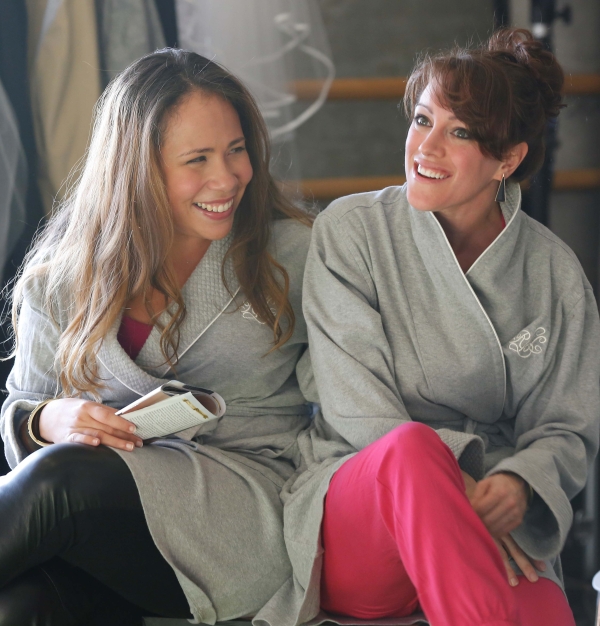Actress Samantha Soule’s Inside Look at Performing Shakespeare for Prisoners
The Public Theater‘s Mobile Shakespeare Unit brings professional Shakespeare productions to correctional facilities, homeless shelters, centers for youth at risk, and other audiences with limited access to the arts. The Unit’s current production, Much Ado About Nothing, recently wrapped a three-week tour of these underserved spaces and has stopped at The Public for a short sit-down run.
TheaterMania spoke to the play’s Beatrice, Samantha Soule (Detroit ’67), about the challenges and payoffs of relinquishing control of space, costumes, and props in order to bring the bard to our community’s most at-risk members.

(© Carol Rosegg)
Did you go into this with any idea of what to expect?
I am an artistic associate of a small company called Rising Phoenix Rep, and we do largely site-specific new work. So I had a fair amount of experience from the production end about functioning with very little and telling a story in unconventional spaces. That’s always been something that’s really close to my heart. So my experience is from that end. As far as Shakespeare in prisons? Never. That’s an all-new experience for me.
What obstacles have you encountered?
It’s turned everything that I was trained to do a little upside down. You don’t know the space that you’ll be performing in until the moment you walk into it. We’ve got a production team [who] runs ahead of us in a car, but sometimes they’re still waiting at the gate when we arrive. So we’re really flying blind. We blocked it in the round so we have four corners and we’ve labeled them as such, so you’d think that that would help, but it really doesn’t. All of a sudden the wall in front of you feels like it should be the back of the room, and it’s like being on a moving conveyor belt or something. And in the prison system, you are along for the ride. If the sirens go off, the sirens go off, and you hold for it.
What have been the rewards of working on this project?
I feel like I’m experiencing what gets to happen when the performers are truly the guests and the audience are the residents. As complicated as it is, it’s their space. Whether they want it to be or not, it is where they reside currently. And we are temporarily visiting and offering what we can. There’s something about that paradigm shift that, for me, removes the pressure of polish and allows us to go back to what feel like a more truthful state. There’s something about that that felt like, Oh right, of course. Isn’t that what it should always be? I forgot how much it’s meaningful to me to do the kind of work that is scrappy and simple.
Sometimes we would walk into prisons and the guards would say, “No, no, no, no,” and all of a sudden your costumes and your props would be gone. So you have actors in clothes they’ve never worn with variations of props they’ve never used, entering from corners they cannot recognize — it’s just…all skills be damned. But there’s some real release. You can hold onto nothing, so all you have is [one another] and your willingness to fail as a group. And I think for me, that is by far the most rewarding thing to participate in, and I think it’s probably the most exciting thing to watch. You watch the terror flick across people’s eyes and then they go, pardon my French, but, “F*ck it, here we go.”
How did the mobile audiences respond?
It’s been really amazing to play for audiences who have been denied so many luxuries and who are living in situations that are so profoundly humbling. They’re given inordinate amounts of time for self reflection, and all of a sudden Shakespeare’s themes of loyalty and betrayal and honor and revenge and love and loss become not hyperbolic or pretentions. They’re just true. You go to these maximum-security prisons and they are whooping with laughter about things I had to look up. Their ears are wide open and they’re right with you with an immediacy and a vibrancy that took my breath away.
What do you appreciate about the sit-down portion?
We have preshow discussions with audience and actors with lights full up, just saying, “This is what we have been doing. We’re going to do exactly what we did with them. This is different than normal theatergoing. We’re going to leave the lights on you the whole time and the actors are going to speak to you.” It opened up the audience in a way I wasn’t predicting. They were as vocal and as vibrant and as responsive as all of the ones we’ve had on the tour. It was so euphoric for me to go, “Oh, even with a five-minute conversation we can get back to the idea that we’re all just people in a room and we’re going to make believe a story for a minute — come along and play with us.” We can actually give theatergoers who are not used to seeing theater like that a taste of what it was like.











